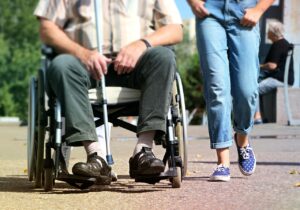Mobility aids like wheelchairs, walkers, and scooters can completely change a senior’s quality of life but their price tags often leave families wondering how to afford them. The good news? There are trusted programs and charities that can help you get a wheelchair for free or at a much lower cost.
Whether you’re a caregiver helping a loved one or a senior exploring your options, this guide walks you through the best ways to find safe, reliable mobility aids without breaking the bank.
Medicare and Medicaid Coverage for Mobility Aids
Does Medicare Pay for Free Wheelchairs or Walkers?
Yes—Medicare Part B may cover 80% of the cost of a medically necessary mobility aid if prescribed by a doctor. This includes:
- Manual wheelchairs
- Power-operated vehicles (scooters)
- Walkers or rollators

To qualify:
- You must have a face-to-face exam with your physician.
- The provider must accept Medicare assignment.
- The supplier must be enrolled in Medicare.
For more details, see Medicare’s guide to durable medical equipment (DME).
Common Medicare Mistakes to Avoid
Many seniors are denied coverage because of incomplete paperwork, using out-of-network suppliers, or skipping the required doctor visit.
Tip: Ask your doctor to clearly document your need for in-home mobility support in your medical records.
Tip: Confirm your equipment provider is Medicare-approved and enrolled before starting the process.
Tip: Some devices require a Certificate of Medical Necessity (CMN). Check with your doctor or supplier to see if it’s needed for your request.
Understanding the Medicare process in advance can help you avoid delays or denials.
What About Medicaid?
Medicaid coverage varies by state but often covers mobility aids when deemed medically necessary. Some states are more generous with powered wheelchairs or home modifications.
Use this state Medicaid directory to find coverage details in your state.
How Veterans Can Get a Free Wheelchair Through the VA
If you’re a veteran, the Department of Veterans Affairs (VA) may provide mobility aids like wheelchairs, scooters, or prosthetics at no cost through the VA Prosthetics and Sensory Aids Service.
To apply:
- Get evaluated at a VA hospital or clinic.
- Work with a VA provider to document your need.
- Approved equipment is delivered or fitted through a local VA partner.
Learn more at VA Health Benefits.
Charities That Help Provide a Free Wheelchair
Several charitable organizations donate wheelchairs and other mobility aids, especially to low-income or uninsured seniors.
Options Include:
- The Wheelchair Foundation: Offers free wheelchairs through global and local partnerships. wheelchairfoundation.org
- Friends of Disabled Adults and Children (FODAC): Provides refurbished wheelchairs and DME to those in need. fodac.org
- Lions Club International: Many local chapters help supply wheelchairs, contact your local chapter to inquire.
You can also contact local religious groups or senior centers, many run equipment loan programs or can help you apply to national grants.
💡 Pro Tip: Don’t overlook Facebook groups or community networks. Search for terms like:
- “Free wheelchair”
- “Free mobility scooter”
Many caregivers and community members donate gently used wheelchairs and walkers in local Buy Nothing groups, neighborhood forums, or senior-specific Facebook communities.
When reaching out to a charity or posting in a group, be ready to share what you need, your location, and whether you’re picking up or need delivery. Kind, specific requests often get quick responses.
Caregiver Tips for Applying for a Free Wheelchair
Caregivers play a vital role in accessing these resources. Here are a few tips:
- Gather documentation early: Prescriptions, diagnosis codes, and ID forms speed up approval.
- Check dual eligibility: Some seniors qualify for both Medicare and Medicaid—this can reduce out-of-pocket costs even more.
- Call before applying: Speak directly with nonprofit representatives or medical equipment suppliers to confirm what’s needed.
- Search locally: County aging offices or Area Agencies on Aging often have additional resources.
FAQs About Getting a Free Wheelchair
Can I get a wheelchair for free if I’m not a senior?
Yes. Many programs and nonprofits provide free or low-cost wheelchairs to people of all ages with disabilities. Medicaid, SSDI, and local equipment loan closets often serve younger adults as well as older individuals.
Does Medicare cover power wheelchairs?
Medicare Part B may cover power wheelchairs if they are medically necessary for use inside the home. To qualify, you’ll need a face-to-face exam and a written prescription from your doctor.
How long does it take to get a free wheelchair?
It depends on the program. Medicare and Medicaid approvals can take several weeks, while nonprofits and reuse programs might have waiting lists. Local loan closets often provide equipment faster if stock is available.
Do I need a doctor’s prescription for a free wheelchair?
Most programs, including Medicare and Medicaid, require a prescription or a letter of medical necessity. Many nonprofits also ask for proof of medical need to prioritize applicants.
Where can I find local programs offering free wheelchairs?
Contact your Area Agency on Aging, disability resource centers, or local community health organizations. Many states have medical equipment reuse programs or loan closets that refurbish and distribute donated wheelchairs.
Staying Mobile Without the High Cost
Accessing a free wheelchair may feel daunting at first, but with the right resources and a little persistence, it’s possible to find the support you or your loved one needs. Start with Medicare or Medicaid, then explore nonprofits and community groups for additional help.
A wheelchair can be more than mobility, it can mean independence, safety, and the freedom to enjoy daily life.
Looking for trusted mobility aids? Visit our Tools We Recommend page for products seniors and caregivers love.
Related Guides on OurSeniorSafety.com
- How to Get a Free Mobility Scooter – Our in-depth guide on scooter programs
- Free Mobility Aids for Seniors – Charities that offer free mobility aids